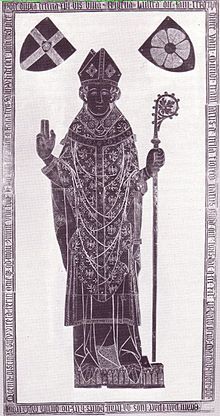Bernhard V. zur Lippe

Bernhard zur Lippe (* 1277 ; † 1341 ) was Bernhard V. Bishop of Paderborn . He is considered the creator of the medieval territory of the diocese of Paderborn , the Bishopric of Paderborn .
Life
Bernhard came from the Lippe family . His parents were Simon I. von Lippe and Adelheid von Waldeck , daughter of Heinrich III. from Waldeck . His siblings were
- Heinrich († approx. 1336), provost in Minden and cathedral scholaster in Münster
- Hermann († 1324), cleric
- Diedrich († 1326), knight in the Teutonic Order
- Simon († approx. 1332), buried in Marienfeld Monastery
- Bernhard V . (1290– 1365), Herr von Lippe, ⚭ Richarda von der Mark (von Saffenberg)
- Adolf
- Mechthild († 1366), ⚭ Count Johann II. Von Bentheim († 1332)
- Adelheid (1298–1324), ⚭ Hermann II of Everstein
- Otto (1300–1360), Herr von Lippe in Lemgo, ⚭ Irmgard von der Mark;
- Hedwig (1313–1369), ⚭ Adolf VII. Von Holstein-Schauenburg († 1352).
His policy, which was shaped by territorial strength, was also reflected in the fact that he was the first bishop to no longer be sealed as a bishop, but as a member of the zur Lippe family. In 1305 Bernhard was appointed provost of Paderborn under Bishop Otto von Rietberg . Then he was appointed tutor and defensor of the secular rule of the bishop of Paderborn and was thus in fact the incumbent bishops Günther (1307-1310) and Dietrich II. (1310-1321). From 1321 to 1341 he held the office of bishop himself.
The distinctive class participation in secular rule over the bishopric gave him a strong position. Accordingly, a council of estates was added to it in 1309, composed of four canons and four ministers and two citizens each from the cities of Paderborn and Warburg . Bernhard undertook to respect the guidelines of the council of estates. The established state legal interaction between cathedral chapter, state nobility and cities led to constitutional laws that were to shape the territory for a long time. Bernhard consolidated the sovereignty in particular by promoting the cities in the Hochstift. Paderborn became one of the most urban territories in Westphalia. Bernhard consolidated the sovereignty in particular through the purchase of the larger part of the city of Brakel and the establishment of the cities of Dringenberg and Peckelsheim . Bernhard also strengthened the Marienmünster monastery , the minor towns of Vörden and Bredenborn , and the city of Beverungen through financial donations .
In 1332, Bernhard initiated expansion measures on the choir of Paderborn Cathedral , in which "the income from the first year of all new clerical offices to be filled for the cathedral building fund should be collected over a period of ten years." The work was interrupted by the city fire of 1340 and only continued from 1343 under his successor Balduin von Steinfurt.
Bernhard financed his measures not only from tax revenues, but also from private property. Since the food crisis of 1316/17 associated with increased financial expenses economic crisis made it necessary for the bishop Bernhard in 1326, with the nobility and the Cathedral Chapter the privilege Bernhardi set. It formed a power contract between the bishop and the estates. For monetary payments, the bishop committed himself to tax privileges in the case of a fundamental promise of assistance from the estates.
literature
- Hans J. Brandt, Karl Hengst : The bishops and archbishops of Paderborn. Paderborn 1984, pp. 141-146, ISBN 3-87088-381-2 .
- Lippe, (Bernhard the younger count of the). In: Johann Heinrich Zedler : Large complete universal lexicon of all sciences and arts . Volume 17, Leipzig 1738, column 1537.
Individual evidence
- ↑ Bernhard Stolte: The Paderborn Cathedral. In: Westfälische Zeitschrift 61, 1903, p. 78.
| predecessor | Office | successor |
|---|---|---|
| Dietrich II of Itter |
Prince-Bishop of Paderborn 1321–1341 |
Baldwin of Steinfurt |
| personal data | |
|---|---|
| SURNAME | Bernhard V. zur Lippe |
| ALTERNATIVE NAMES | Bernhard zur Lippe |
| BRIEF DESCRIPTION | Roman Catholic bishop |
| DATE OF BIRTH | 1277 |
| DATE OF DEATH | 1341 |